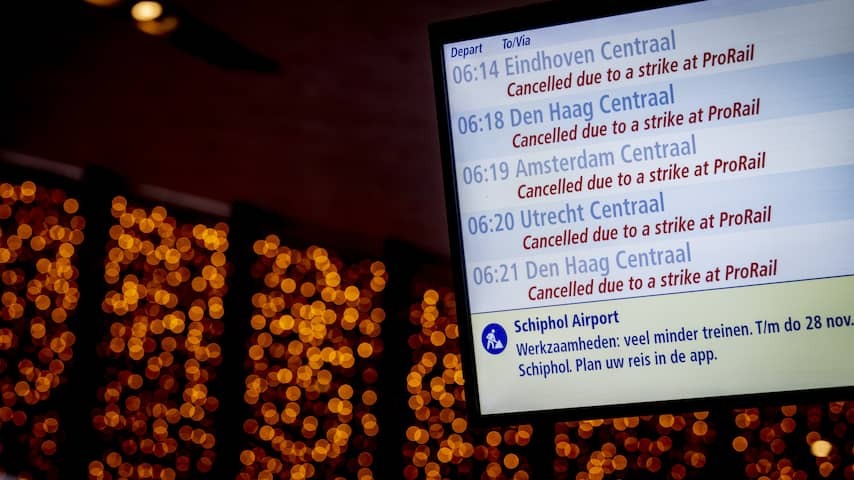
It is impossible to travel by NS trains on Friday due to a staff strike. But when are you actually allowed to strike? And when is the inconvenience experienced by the employer and others still within limits?
Employees strike to, for example, force a better wage or collective labor agreement from their employer. But sometimes the employer is not the only one affected. For example, strikes make it more difficult to get medicines, buy your product in the supermarket, or go to work by train. People who often can’t do much about it are left out in the cold.
The right to strike is enshrined in the European Social Charter. It states that as an employee, you may temporarily stop working if your employers and the unions can no longer agree. “That moment is, for example, when the negotiations get stuck,” says Arnold Birkhoff, partner and labor law attorney at Kneppelhout lawyers. He works on collective labor agreement negotiations with unions and lawsuits about strikes, among other things.
Employees are taking that opportunity. On Friday, part of the NS staff in the Central Netherlands will stop working because negotiations between the FNV and the NS have stalled. As a result, no trains will run throughout the Netherlands.
Besides rules, there is also a gray area
However, striking is not always allowed just like that. There are rules attached to it. “For example, you must announce a strike to your employer in good time. And the means, such as a strike, must be reasonable. This means that a strike must be proportionate to your ultimate goal, such as a higher wage or better collective labor agreement,” Birkhoff emphasizes.
Your employer can also go to court to limit or prohibit a strike. “A strike can be prohibited if this is socially necessary. For example, the court can prohibit a strike if public order or public health may be endangered,” says Birkhoff. When exactly this is the case is not clear, according to the labor law attorney: “As is often the case in law, it remains a gray area.”
An employer may also not suffer disproportionate economic damage from a strike. For example, Schiphol forced the court to ensure that the airport remained accessible in September during a national public transport strike for an improved early retirement scheme.
However, different rules apply to sectors, says Professor of Labor Law Evert Verhulp. “For example, there must be no deaths. So in the event of a strike by healthcare personnel, a first-aid post must be open.” Medicines also always remain available in emergencies during pharmacy strikes.
Rules also apply to your employer: they may not simply hire temporary workers when you strike. That is breaking a strike. So if you stop working, it really is a strike.
‘Complaining is allowed, but respectfully’
According to Verhulp, strikes are still often prohibited, even though it is a fundamental right. “We find strikes very annoying in the Netherlands. And as a result, we as a society are very cautious when it comes to stopping work.”
“Striking is also a social thing,” says Birkhoff. “When you experience inconvenience because, for example, your train is not running due to a strike, you are also encouraged to think about something.” For example, according to the labor law attorney, you can ask yourself whether the group on strike might have a point.
That doesn’t take away from the fact that you are not allowed to complain, Birkhoff emphasizes. “Of course you can. But you must also have respect for the other person. After all, the right to strike is an important element of our rule of law. Any form of restriction thereof is a direct weakening of that rule of law.”
‘It has to hurt, otherwise it’s pointless’
The FNV union states that the rules of the right to strike are observed when organizing strikes. “That also goes hand in hand with safety consultations and timely communication to employers and people who may experience inconvenience,” says FNV vice-chairman Zakaria Boufangacha. “And we are scaling up strikes; we are not flattening the entire country. But we first opt for a few hours, or parts of the country.”
But at the same time, striking must also hurt the employers, according to the vice-chairman. “Otherwise it has no effect. And yes, sometimes that also indirectly affects other people.” Boufangacha emphasizes that the FNV regrets this, but also that there is a lot of understanding when the union explains that it is also difficult for the striking members. “After all, they also want to be able to pay their bills and do their work properly.”